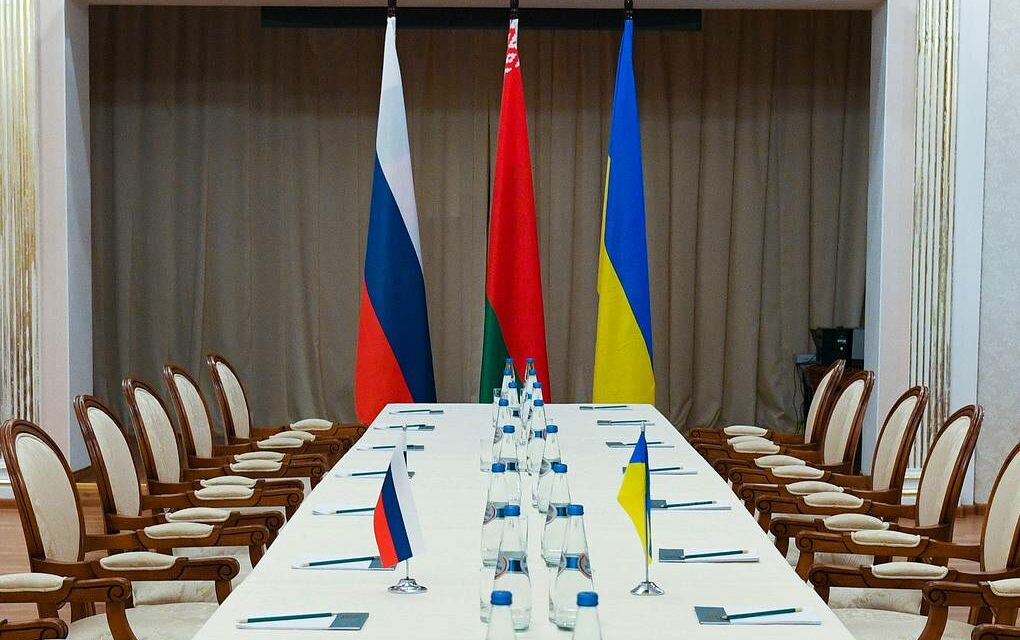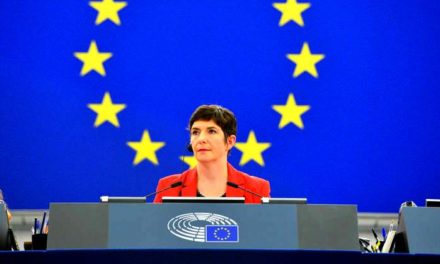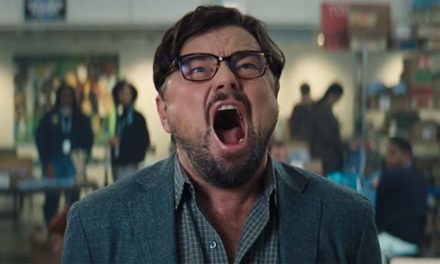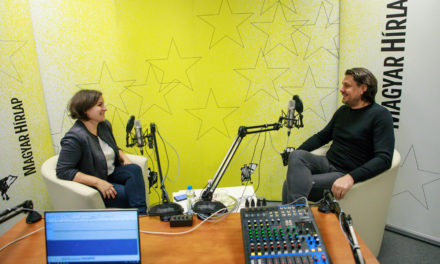Due to the events of the 20th century, Ukraine inherited a huge, rich country from the dissolved Soviet Union, the eastern parts - where the fighting is now going on - were annexed to Ukraine during Lenin's time, the western parts were annexed from Poland and Hungary as a result of the Second World War, and the Crimea in 1954 was presented to Ukraine by Khrushchev in memory of Ukraine joining the Russian Empire three hundred years earlier. They should have done nothing else in order to keep the country than to accept perpetual neutrality, like Austria at that time, and to maintain good relations with the weakened but still strong Russia next to them. Ukrainian leaders, known only as oligarchs in the West, were not able to do this, but can we blame them alone? Ukraine has become one of the most significant conflict points in the new geopolitical situation resulting from the collapse of the Soviet Union and the rise of China.
Historians usually attribute great transformations to one or two reasons afterwards, but in reality, many factors influence the course of history. Those skilled in geometry can imagine this as a number of vectors pointing in different directions, which eventually have a long-term residual effect that determines historical changes, and which historians explain in hindsight as a logical development. However, no one can see in advance what will happen. Putin also did not imagine the intervention in Ukraine as it turned out.
In today's multi-factorial geopolitical situation – on the big chessboard, as former American national security adviser Zbigniew Brzezinski called it – the United States is undoubtedly the main player. But even America cannot be considered a homogeneous entity. Apart from the culture war taking place in the country, which, if it continues, could in itself question the role of the United States in world politics in the long term, different concepts are also fighting each other in the field of foreign policy. There are those who have America's national interests in mind and are less willing to assume the role of world policeman, while there are forces that want to use the economic and military power of this powerful country to dominate the world.
An example of the former at the advisory level is Henry Kissinger, whose name is associated with advocating a policy of détente, ending the Vietnam War, establishing diplomatic relations with China and, most recently, understanding Russian demands regarding Ukraine. The other side is represented, among others, by theoreticians such as Charles Krauthammer, the announcer of the unipolar world order, or Zbigniew Brzezinski, the main proponent of NATO expansion.
Charles Krauthammer explained in his article published in 1990 in Foreign Affairs, the leading journal of American foreign policy, that “We are living in abnormal times. In times like this, our best hope for security, as in previous difficult times, is America's strength and determination, the strength and determination for America to lead the unipolar world, unashamedly laying down the rules of the world order and enforcing its compliance."
Zbigniew Brzezinski outlines the strategy for NATO expansion in his article published in Foreign Affairs in 1995. The article starts with the security benefits that NATO can provide to the new member states - by acknowledging the justified Russian demands - but by the end of the article, the author has come to the point that Russia cannot have any demands, it must accept that the former Soviet member states - including Ukraine - will become a member of NATO, otherwise it will face complete isolation and possibly war.
Perhaps Brzezinski's best-known work is the book A nagy sakktábla, published in 1997. In this volume, the processes of world politics appear like a chess board (I do this, he does that), and he basically says that the future of the world will be decided in Eurasia, and even in the middle of it, in the territory of the southern member states of the former Soviet Union, because in terms of its population and natural resources it is this area that has significant development perspectives.
Therefore, for America, "the most immediate task is to ensure that no state or group of states is able to expel the United States from Eurasia or even significantly reduce its role as arbiter." With due foresight, he even adds that "as America becomes an increasingly multicultural society, it will become increasingly difficult to build consensus on foreign policy issues, except for a truly massive and widely perceived direct external threat." In other words, America must increasingly look for external enemies, ones that the general public accepts as such.
After the Russian occupation of Crimea, he explains that Ukraine will not be able to cope with the Russian forces in the open field, but must prepare for permanent urban resistance. America should equip Ukraine partly with organizational assistance and partly with hand-launched anti-tank and other missiles so that the Ukrainians can resist until the costs of the war for the Russians become unbearably high, both economically and politically.
The strategy formulated almost three decades ago is now being implemented, just as Brzezinski outlined at the time. The first steps on the big chessboard were made during Clinton's time, when Poland, the Czech Republic and Hungary were the first former socialist countries to join NATO (1999), then the other countries followed, and in 2008 membership was already offered to Ukraine . Such a step was the establishment of the Partnership for Peace, which is the anteroom of NATO, and among its members we find the Central Asian countries that Brzezinski placed in the middle of the big chessboard (Eurasia).
This was followed by the financial and political support of the democratic forces in these countries, the aim of which was to create pro-Western governments, and the most important step of which was the political revolution in Ukraine in 2014, during which the otherwise democratically elected Ukrainian president was ousted with effective American financial and political support. and to put nationalist forces at the head of the country whose goals perfectly serve the strategy formulated by Brzezinski.
The first Russian response took place in 2008, when Georgia attacked the two breakaway provinces, Abkhazia and South Ossetia, with American encouragement. The Russians repulsed the attack and secured the independence of the two breakaway provinces (from Georgia). The second move took place in 2014, when after the turn in Kiev, Russia faced the fact that its Black Sea naval port would soon fall into NATO hands. Then they occupied Crimea. The new Ukrainian government began a violent Ukrainization, the result of which was the independence of Luhansk and Donetsk.
This was followed by a continuous attack on these areas by the Ukrainian side, and when they were armed by the Americans and prepared for a more serious attack, Russia intervened directly with "special military operations". The Russian assumption was that the Ukrainians would get rid of their leaders and thus Ukraine could be removed from NATO. However, this idea did not materialize. With American support and the urban warfare recommended by Brzezinski, the Ukrainian nationalists - using the civilian population as a protective shield - are resisting hard. In this war, the Euro-Atlantic media is also a belligerent party, it wants to convince the population of the Euro-Atlantic region that the war broke out solely because of Putin's imperial aspirations.
In the meantime, the military alliance of Australia, the United Kingdom and the United States (AUKUS) was established to contain the economically and militarily growing China in the Pacific region. This is where we are now, the question is what other steps can be taken on the big chessboard.
The outcome of the Russian-Ukrainian war could be decisive from this point of view. The battle for the capture of Mariupol proved for the Russians that the capture of large cities is not militarily profitable. If they don't want to lose, they have to figure out how to isolate the Ukrainian army from Western arms shipments, which would require a permanent military occupation of the country. For this reason, there is no possibility of making peace in the foreseeable future.
In the meantime, the situation may change in the hinterlands as well. The West expects that the sanctions will cause economic hardship to Russia to such an extent that it will intensify internal resistance and possibly lead to regime change. But the same could happen in America, hit by the Cultural Revolution, and in Europe suffering from the backlash of sanctions. These are small vibrations of the chessboard, the effect of which cannot be foreseen, but which can significantly influence the course of events.
So the officers have started to be pushed back and forth on the big chessboard, it is not expected that one side will give checkmate to the other, the likely result will be that the interested parties will get tired and draw in some situation.
Author: economist Károly Lóránt
Source: Magyar Hírlap
Photo: Russian Ministry of Foreign Affairs / Alexander Kryazhev/POOL/TASS












